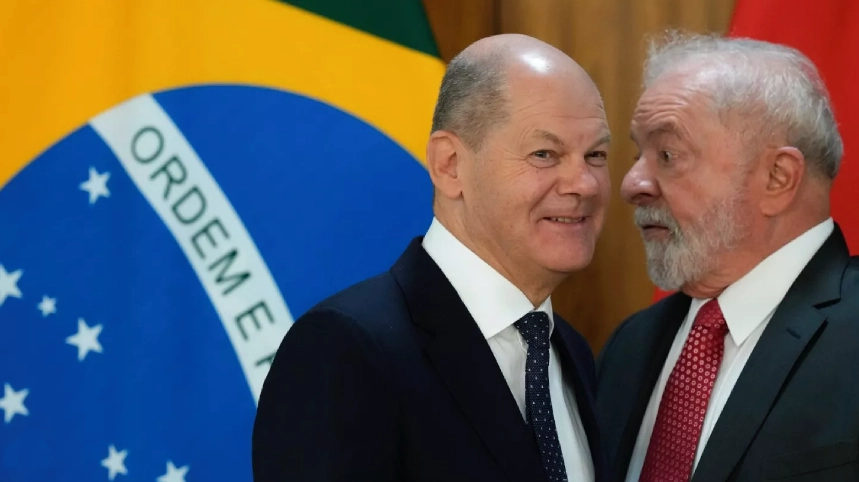We have become accustomed to the EU-Mercosur agreement being a roller coaster ride, with ups and downs, as the last two weeks have shown. There are sometimes windows of opportunity to make progress in stalled diplomatic negotiations. But it is also important to seize the moment. With the Spanish presidency of the EU Council and Brazil’s pro tempore presidency of Mercosur in the second half of the year, a window has opened, and both governments are committed to achieving the signing of the agreement in 2023.
Lula’s participation in COP28 in Dubai, where he met with Spanish Prime Minister Pedro Sanchez and French President Emmanuel Macron, among others, as well as government consultations with Germany in Berlin on the flight back to Brazil, fueled hopes that the agreement could be signed at the Mercosur summit in Rio on December 7. But the governments of France and Argentina were quick to dampen the emerging euphoria.
The EU-Mercosur agreement teaches us a lot about the problems of EU trade relations with Latin America, but also with other regions and countries. There is a lot of hypocrisy on the European side. When you practice agricultural protectionism, you should not pretend that you want to protect the climate and biodiversity, as French President Emmanuel Macron did recently. Otherwise, the EU will lose its credibility on climate protection and will be rightly accused of imposing non-tariff barriers to trade if it introduces climate protection measures that affect trade with third countries.
It is worth remembering that the EU-Mercosur agreement is not the only agreement currently blocked by European agricultural protectionism. For the same reason, Australia broke off negotiations on a free trade agreement with the EU in October.
Brazil has made great progress this year in protecting the Amazon rainforest from deforestation. But I believe that even with zero deforestation and extensive reforestation the French president would still find reasons why the EU-Mercosur agreement cannot be signed. Now that the villain Bolsonaro is gone, President Macron hopes that the new Argentine President Milei can become the new villain in the EU-Mercosur drama to divert attention from his efforts to prevent the adoption of the agreement.
More honesty would be good for both sides. One can speculate that Argentine President Alberto Fernandez would have had no problem signing an EU-Mercosur agreement at the Mercosur summit if the winner of the presidential election had been Sergio Massa and not Javier Milei. Now the EU-Mercosur agreement, which Peronists never fully supported, passes to his successor so that Peronists from the opposition can mobilize against the agreement if they see fit.
By postponing once again the signing of the agreement, the French government is playing a dangerous game. After the next European Parliament elections in June 2024, approval by the European Parliament could become more difficult.
There is sometimes speculation in Europe that, if the EU-Mercosur agreement fails, bilateral trade agreements could be concluded in the future with each of the Mercosur member countries. However, based on past experience, they would face the same obstacle of European agricultural protectionism.
On the European side, not only the French president opposes the agreement, but also a broad front of NGOs. Sometimes the impression is given that the EU-Mercosur agreement will make all the world’s problems worse and that not signing it will save the climate and lead to a fairer society and sustainable development in Latin America. This demonstrates a nostalgic and biased view of NGOs that overestimates Europe’s influence in the world and Latin America’s dependence on Europe.
Most European NGOs live in a bubble and ignore the geo-economic and geopolitical realities of Latin America and the world. To give an example, in 2022, 54.7% of Brazilian beef exports (by volume) went to China and only 3.8% to the EU. And during the period of January-September 2023, only 13.2% of all Brazilian agricultural exports (value) went to the EU, compared to 53.5% to Asia.
There is a major contradiction on the European side. On the one hand, the EU has a geopolitical and geostrategic discourse that claims to want to defend Europe’s strategic autonomy. On the other hand, EU trade policy is often petty and parochial when it comes to agricultural protectionism. A failure of the EU-Mercosur agreement due to resistance from France and a few other governments will weaken Europe’s geopolitical and geoeconomical position throughout Latin America, and will also impact negatively on future trade agreement negotiations in other regions of the world.
With this type of trade policy, the EU cannot compete with China. In Mercosur, there are more and more voices advocating parallel negotiations for a free trade agreement with China. This could weaken the EU’s negotiating position if China imposes fewer conditions on Mercosur. The Mercosur summit also saw the signing of a free trade agreement with Singapore (after only five years of negotiations), a clear sign that Mercosur is increasingly opening up to Asia.
It appears that France, which would like to be captain of Europe’s team, is about to score an own goal for the EU. That would not be good for Europe or EU-Latin American relations. But there is always room for surprises. Perhaps France will realize its geopolitical responsibility in European foreign policy and act accordingly. Or that most of European governments will ignore France’s objections to the trade part of the agreement. And perhaps the influence of former President Macri will make the new Argentine government want to sign the agreement very soon. The EU-Mercosur agreement has often been declared dead, but to paraphrase Mark Twain, one could say that reports of the agreement’s death have been greatly exaggerated.
*Translated by Janaína Ruviaro da Silva from the original in Spanish











